Welcome to the Markaz Review Book Club, moderated by Rana Asfour,
we meet online every month to discuss the latest title.
The June 2025 selection is The Guardian of Surfaces (UK) (The Book Censor’s Library -US) by Bothayna Al Essa, translated by Sawad Hussain & Ranya Abdelrahman
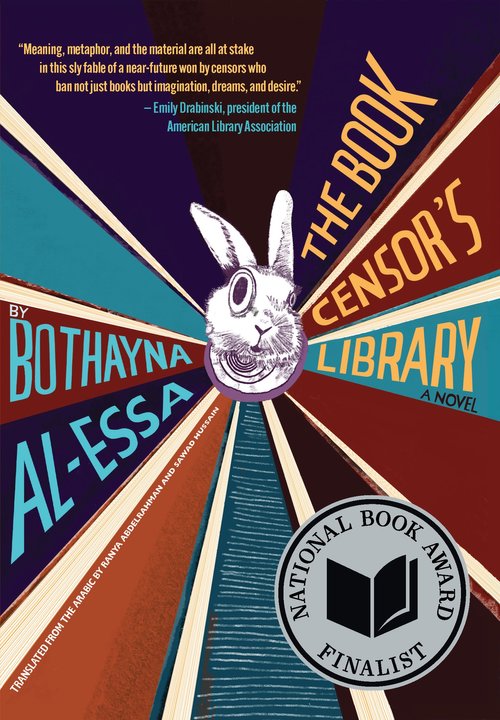 We will meet to discuss the book online on Sunday, June 29th at 1 pm Eastern/19:00 CET. RSVP here to participate.
We will meet to discuss the book online on Sunday, June 29th at 1 pm Eastern/19:00 CET. RSVP here to participate.
A national book award finalist, the novel is a reckoning with the global threat to free speech and the bleak future it all but guarantees. Bothayna Al-Essa marries the steely dystopia of Orwell’s 1984 with the madcap absurdity of Carroll’s Alice in Wonderland, resulting in a dreadful twist worthy of Kafka. The Guardian of Surfaces is a warning call and a love letter to stories and the delicious act of losing oneself in them.
The new book censor has not slept soundly in weeks. By day, he combs through manuscripts at a government office, looking for anything that would make a book unfit to publish-allusions to queerness, unapproved religions, any mention of life before the Revolution. By night, pilfered novels pile up in the house he shares with his wife and daughter, and the characters of literary classics crowd his dreams. As the siren song of forbidden reading continues to beckon, he descends into a netherworld of resistance fighters, undercover booksellers, and outlaw librarians trying to save their history and culture.
About the author & the translators:
Bothayna Al-Essa (author) is the bestselling Kuwaiti author of nearly a dozen novels and additional children’s books. She is also the founder of Takween, a bookshop and publisher of critically acclaimed works. Her most recent book, The Book Censor’s Library, won the Sharjah Award for Creativity in the novel category in 2021 and is her third novel to appear in English, after Lost in Mecca and All That I Want to Forget. Al-Essa was author-in-residence at the British Centre for Literary Translation for the summer of 2023, and the recipient of Kuwait’s Nation Encouragement Award for her fiction in 2003 and 2012. She has written books on writing and led writing workshops throughout the Arab world.
Sawad Hussain is a translator from Arabic whose work in 2023 was shortlisted for The Warwick Prize for Women in Translation and the Saif Ghobash Banipal Prize for Arabic Literary Translation, and longlisted for The Moore Prize for Human Rights Writing. She is a judge for the Palestine Book Awards and the Armory Square Prize for South Asian Literature in Translation (2024 cycle). Her most recent translations include Edo’s Souls by Stella Gaitano (Dedalus Books), Djinn’s Apple by Djamila Morani (Neem Tree Press).
Ranya Abdelrahman is a translator of Arabic literature into English. After working for more than 16 years in the information technology industry, she changed careers to pursue her interest in books, promoting reading and translation. Abdelrahman has published translations in ArabLit Quarterly, The Markaz Review, and The Common, and is the translator of Out of Time, a short story collection by Palestinian author Samira Azzam.
RSVP here to participate in the discussion.
The July 2025 selection is The Burning Heart of the World by Nancy Kricorian
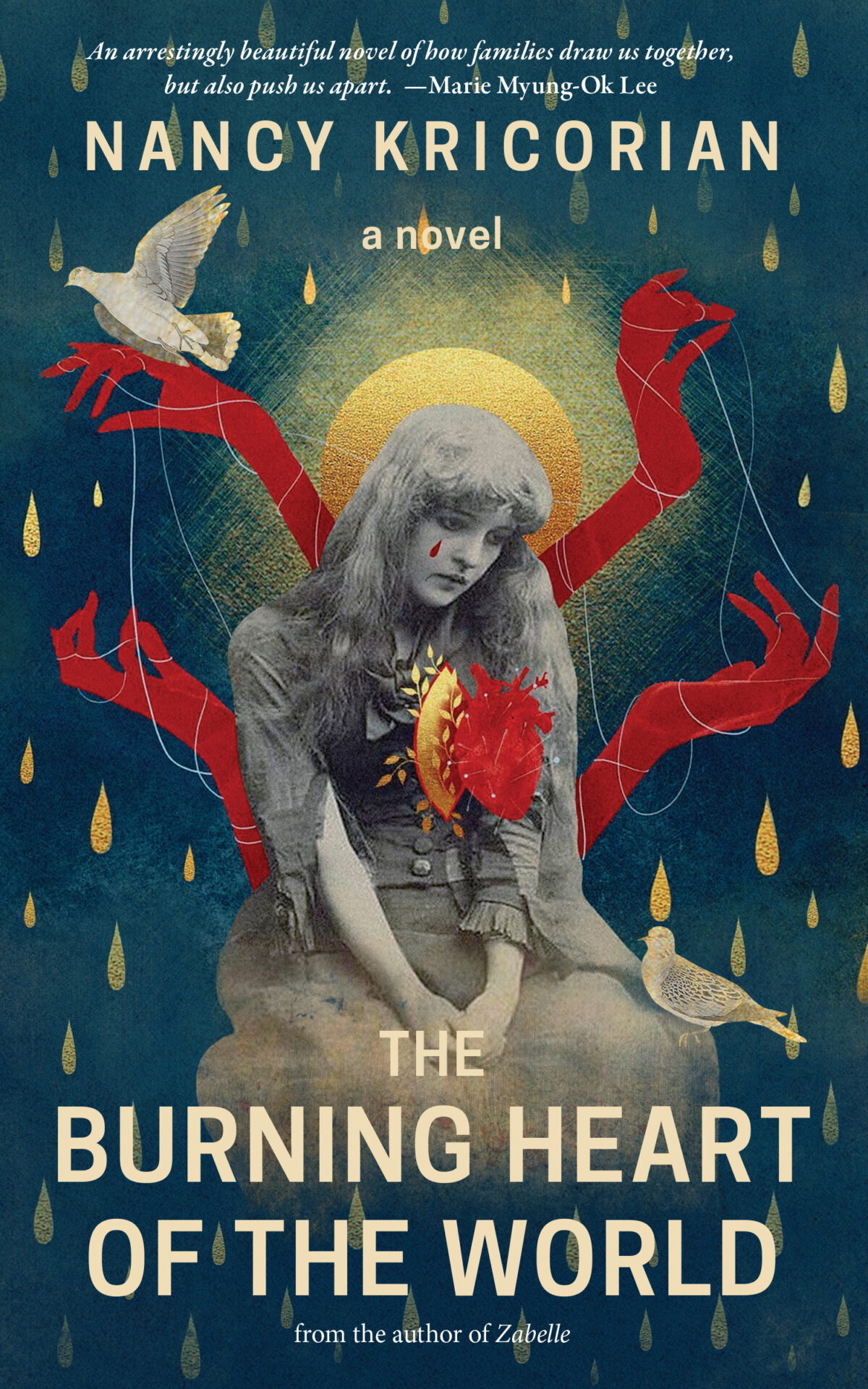 We will meet to discuss the book online on Sunday, July 27th at 1 pm Eastern/19:00 CET.
We will meet to discuss the book online on Sunday, July 27th at 1 pm Eastern/19:00 CET.
In vivid, poetic prose, Nancy Kricorian’s The Burning Heart of the World tells the story of a Beirut Armenian family before, during, and after the Lebanese Civil War. Returning to the fabular tone of Zabelle, her popular first novel, Kricorian conjures up the lost worlds and intergenerational traumas that haunt a family in permanent exile. Leavened with humor and imbued with the timelessness of a folktale, The Burning Heart of the World is a sweeping saga that takes readers on an epic journey from the mountains of Cilicia to contemporary New York City.
About the author:
Nancy Kricorian is the author of the novels Zabelle, Dreams of Bread and Fire, and All The Light There Was, focused on post-genocide Armenian diaspora life. She has taught at Barnard, Columbia, Yale, and New York University, as well as with Teacher & Writers Collaborative in the New York City Public Schools and for the Palestine Writing Workshop in Birzeit. She has been the recipient of a New York Foundation for the Arts Fellowship, a Gold Medal from the Writers Union of Armenia, and the Anahid Literary Award. She lives in New York City.
Published by Red Hen Press, 2025.
The September 2025 selection is Sand-Catcher by Omar Khalifah, translated by Barbara Romaine
 We will meet to discuss the book online on Sunday, September 28th at 1 pm Eastern/19:00 CET.
We will meet to discuss the book online on Sunday, September 28th at 1 pm Eastern/19:00 CET.
A sardonic, thrilling fable about collective memory and the many ways it can be saved or subverted. Omar Khalifa’s debut novel Sand-Catcher is at once a polyphonic satire and a tightly plotted tale of suspense. Walking the line between gallows humor, rage, and depthless heartbreak, it is a unique reflection of contemporary Palestinian identity in all its facets.
Four young, Palestinian journalists at a Jordanian newspaper are tasked, on account of their heritage, with profiling one of the last living witnesses of the Nakba, the violent expulsion of native Palestinians by the nascent state of Israel in 1948. Confident that the old man will be all too happy to go on record, the reporters are nonplussed when they are repeatedly, and obscenely, rebuffed. This living witness to history, this secular saint, has no desire to be interviewed, no desire for his memories to be preserved, no desire to serve as an inspiration for the youth of tomorrow. What he wants is to be left alone.
As threats from the team’s editor-in-chief put more and more pressure on the journalists, they must decide just how far they’re willing to go to get the old man on the record. After all, what possible weight can one stubborn demand for privacy have when balanced against the imperative to bear witness?
About the author & translator:
Omar Khalifah (author) is a novelist and short story writer in Arabic. His book, Nasser in the Egyptian Imaginary, was published in English by Edinburgh University Press in 2017. His collection Ka’annani Ana (As If I Were Myself) was published in Amman, Jordan in 2010, and his novel Qabid al-Raml (Sand-Catcher) was published in 2020. His articles have appeared in Middle East Critique and Journal of World Literature. A Fulbright scholar, Khalifah is assistant professor of Arabic Literature and Culture at Georgetown School of Foreign Service in Qatar.
Barbara Romaine is an academic and literary translator. She has published translations of five novels, most recently Waiting for the Past (Syracuse University Press, 2022), by the Iraqi novelist Hadiya Hussein. She has held two NEA fellowships in translation, one of which was for her work on Radwa Ashour's Spectres (Interlink Books, 2011). Spectres went on to place second in the 2011 Saif Ghobash-Banipal international translation competition. Romaine’s translations of essays, short stories, and classical poetry have appeared in a variety of literary periodicals.
Published by Coffee House Press, 2024.
The October 2025 selection is Harraga by Boualem Sansal, translated by Frank Wynne
We will meet to discuss the book online on Sunday, October 26th at 1 pm Eastern/19:00 CET.
Harraga. The term means “to burn,” and it refers to those Algerians in exile, who burn their identity papers to seek asylum in Europe. But for Boualem Sansal, whose novels are banned in his own country, there is a kind of internal exile even for those who stay; and for no one is it worse than for the country’s women.
Lamia is thirty-five years old and a doctor. Having lost most of her family, she is accustomed to living alone, unmarried, and contentedly independent when a teenage girl, Chérifa, arrives on her doorstep. Chérifa is pregnant by Lamia’s brother in exile — Lamia’s first indication since he left that he is alive and she’ll surely be killed if she returns to her parents. Lamia grudgingly offers her hospitality; Chérifa ungratefully accepts it. But she is restless and obstinate, and before long she runs away, out into the hostile streets leaving Lamia to track her, fearing for the life of the girl she has come, improbably, to love as family.
Boualem Sansal creates, in Lamia, an incredible narrator: cultured, caustic, and compassionate, with an ironic contempt for the government, she is utterly convincing. With his deceptively simple story, Sansal delivers a brave indictment of fundamentalism that is also warm and wonderfully humane.
About the author & the translator:
Boualem Sansal was born in Algiers, Algeria, in 1949. Trained as an engineer with a doctorate in economics, he began writing novels at the age of 50 after retiring from his job as a high-ranking official in the Algerian government. The assassination of President Boudiaf in 1992 and the rise of Islamic fundamentalism in Algeria inspired him to write about his country. Sansal writes in French, and his work has won top literary awards in France, among them the Prix du Premier Roman in 1999. Politicians, writers and activists have called for the release of French-Algerian writer Boualem Sansal, whose arrest in Algeria in December 2024 is seen as the latest instance of the stifling of creative expression in the military-dominated North African country.
Frank Wynne is a literary translator. Born in Ireland, he moved to France in 1984. He began translating literature in the late 1990s, and in 2001 decided to devote himself to this full time. He has translated works by, among others, Michel Houellebecq, Frédéric Beigbeder, Ahmadou Kourouma, Boualem Sansal, Claude Lanzmann, Tómas Eloy Martínez and Almudena Grandes. His work has earned him a number of awards, including the Scott Moncrieff Prize and the Premio Valle Inclán. Most recently, his translation of Vernon Subutex was shortlisted for the Man Booker International 2018.
Published by Bloomsbury, 2015.
The November 2025 selection is Whispering Walls by Choman Hardi
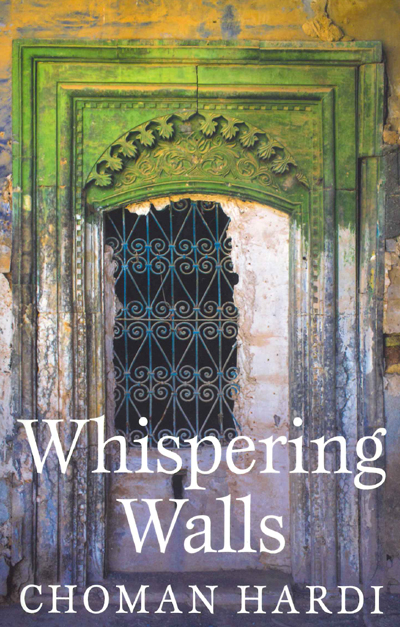 We will meet to discuss the book online on Sunday, November 30th at 1 pm Eastern/19:00 CET.
We will meet to discuss the book online on Sunday, November 30th at 1 pm Eastern/19:00 CET.
The U.S. invasion of Iraq is looming. Three siblings – two in London, one in Slemany – recall their troubled past. Stories of war, displacement, and coming to terms with the tragedies of a Kurdish family, all told from their different perspectives.
Torn between two countries and various life stories, the siblings find themselves dealing with complex life choices and the mystery of their sister’s suicide 22 years ago.
Whispering Walls is a story of love, relationships, affection, and hope, with a cautious view of the future.
About the author:
Choman Hardi is an educator, poet, and scholar whose work is informed by an intersectional approach to inequality. She is renowned for her pioneering work on issues of gender and education. She returned home after twenty-six years of displacement, to teach English and initiate gender studies at the American University of Iraq- Sulaimani (AUIS). She founded the Center for Gender and Development Studies (CGDS) there. She is the author of critically acclaimed books in the fields of poetry, academia, and translation. Her translation of Sherko Bekas’s Butterfly Valley (ARC Publishing) won a PEN Translates Award.
Published by Afsana Press, 2023.
Past Events :
The May 2025 selection is Honey Hunger by Zahran Alqasmi, translated by Marilyn Booth
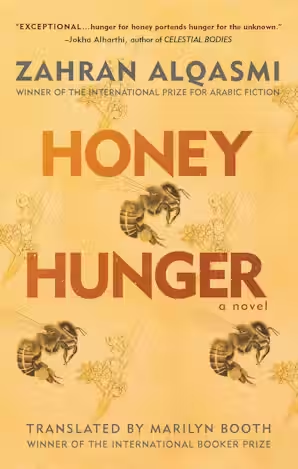 We met to discuss the book online on Sunday, May 25th at 1 pm Eastern/19:00 CET.
We met to discuss the book online on Sunday, May 25th at 1 pm Eastern/19:00 CET.
A novel of longing, uncertainty, and ultimately of hope, written by an International Prize for Arabic Fiction-winning author and an International Booker-prize winning translator.
Azzan is a beekeeper in a rural community in Oman. Devoted to tending his bees and searching for wild hives, he encounters Thamna, a lone shepherd woman, on a mountain slope and is captivated by her and her honey-colored eyes.
Across the vistas of Oman’s remote mountains and plains, Azzan’s troubled past and present unfold. A disappointment to his family, he turns to drink, and ultimately discovers the healing power of his beekeeping, before an accident in which he loses all.
Zahran Alqasmi’s masterful novel thrums forward with a subtle momentum. His lucid, poetic writing conveys a visceral sense of time and place, of the fragile ecologies inhabited by both bees and humans alike, in this intense and compelling novel of loss and hope.
Published by Hoopoe, 2025.
About the author & translator:
Zahran Alqasmi (Author) is an Omani poet and novelist, born in the Sultanate of Oman in 1974. Honey Hunger was his third of four published novels, and in 2023 he won the International Prize for Arabic Fiction (IPAF) for The Water Diviner. He has also published ten poetry collections and a collection of short stories.
Marilyn Booth (Translated by) is professor emerita, Faculty of Asian and Middle Eastern Studies and Magdalen College, Oxford University. She has translated many works of Arabic fiction into English. Her translations of Omani author Jokha Alharthi include Bitter Orange Tree and Celestial Bodies, which was awarded the International Booker Prize. She has also translated Hoda Barakat, Hassan Daoud, Elias Khoury, Latifa al-Zayyat, and Nawal al-Saadawi. Her research publications focus on Arabophone women’s writing and the ideology of gender debates in the nineteenth century, most recently The Career and Communities of Zaynab Fawwaz: Feminist Thinking in Fin-de-siècle Egypt.
The April 2025 selection was The Dissenters by Youssef Rakha
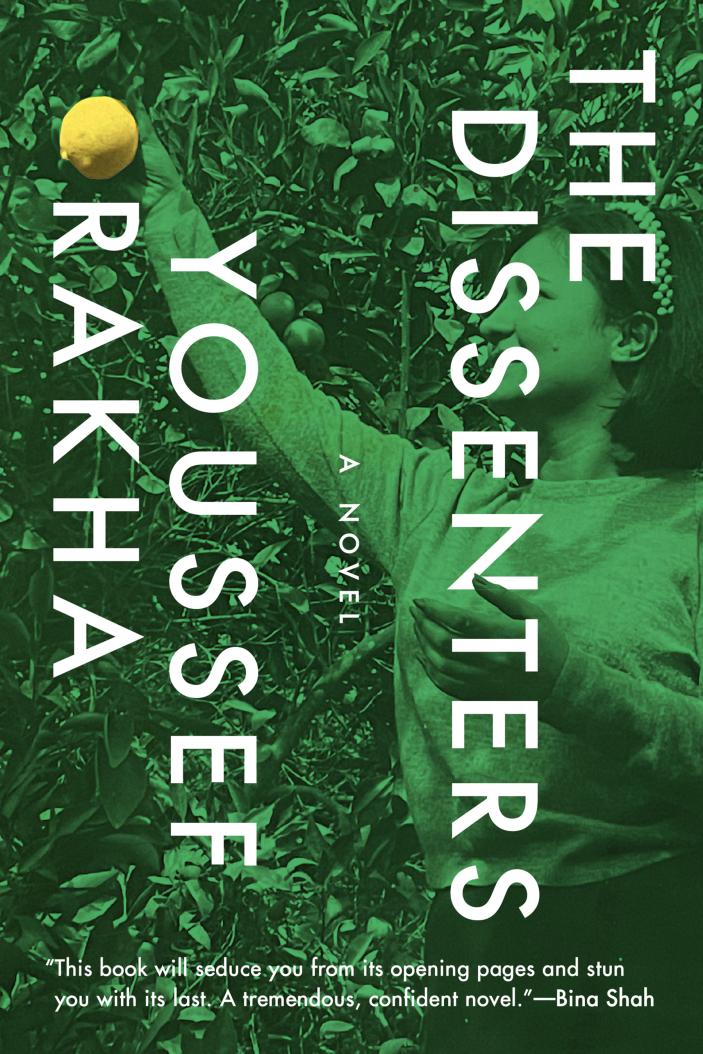 We met to discuss the book online on Sunday, April 27th at 1 pm Eastern/19:00 CET.
We met to discuss the book online on Sunday, April 27th at 1 pm Eastern/19:00 CET.
Hallucinatory, erotic, and stylish, The Dissenters is a transcendent portrait of a woman and an era that explodes our ideas of faith, gender roles, freedom, and political agency.
Amna, Nimo, Mouna—these are all names for a single Egyptian woman whose life has mirrored that of her country. After her death in 2015, her son, Nour, ascends to the attic of their house where he glimpses her in a series of ever more immersive visions: Amna as a young woman forced into an arranged marriage in the 1950s, a coquettish student of French known to her confidants as Nimo, a self-made divorcee and a lover, a “pious mama” donning her hijab, and, finally, a feminist activist during the Arab Spring. Charged and renewed by these visions of a woman he has always known as Mouna, Nour begins a series of fevered letters to his sister—who has been estranged from Mouna and from Egypt for many years—in an attempt to reconcile what both siblings know about this mercurial woman, their country, and the possibility for true revolution after so much has failed.
Published by Graywolf Press, 2025.
About the author:
Youssef Rakha is an Egyptian novelist, poet and critic working in both Arabic and English. His short story collection, Emissaries, is out from Barakunan. His first novel The Dissenters, is his first novel. He lives with his family in Cairo.
The March 2025 selection was Sumūd: A New Palestinian Reader edited by TMR editors Malu Halasa & Jordan Elgrably
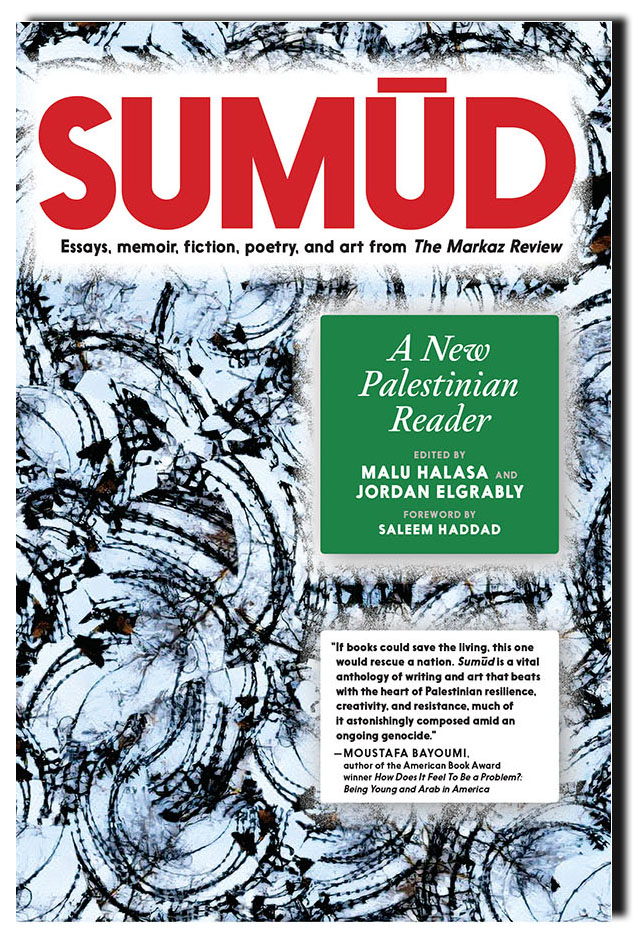 We met to discuss the book online on Sunday, March 30th at 1 pm Eastern/19:00 CET.
We met to discuss the book online on Sunday, March 30th at 1 pm Eastern/19:00 CET.
When governments around the world enable the genocide of a people and the dilapidation of a sacred homeland, the Palestinian people stand fast and resist. The fifty-eight contributions in this collection remind readers that just as love perseveres, so do the Palestinians, and their struggles and triumphs.
Sumud stands for a rich riposte to those who would denigrate Palestinians’ aspirations for a homeland. It also serves as a timely reminder of culture’s power and importance during occupation and war. This anthology spans the 20th and 21st centuries of Palestinian cultural history, and highlights writing from 2021–2024. It also includes twenty-five black-and-white illustrations by Palestinian artists.
Published by Seven Stories Press, 2025.
The February 2025 selection was Too Soon: A novel by Betty Shamieh
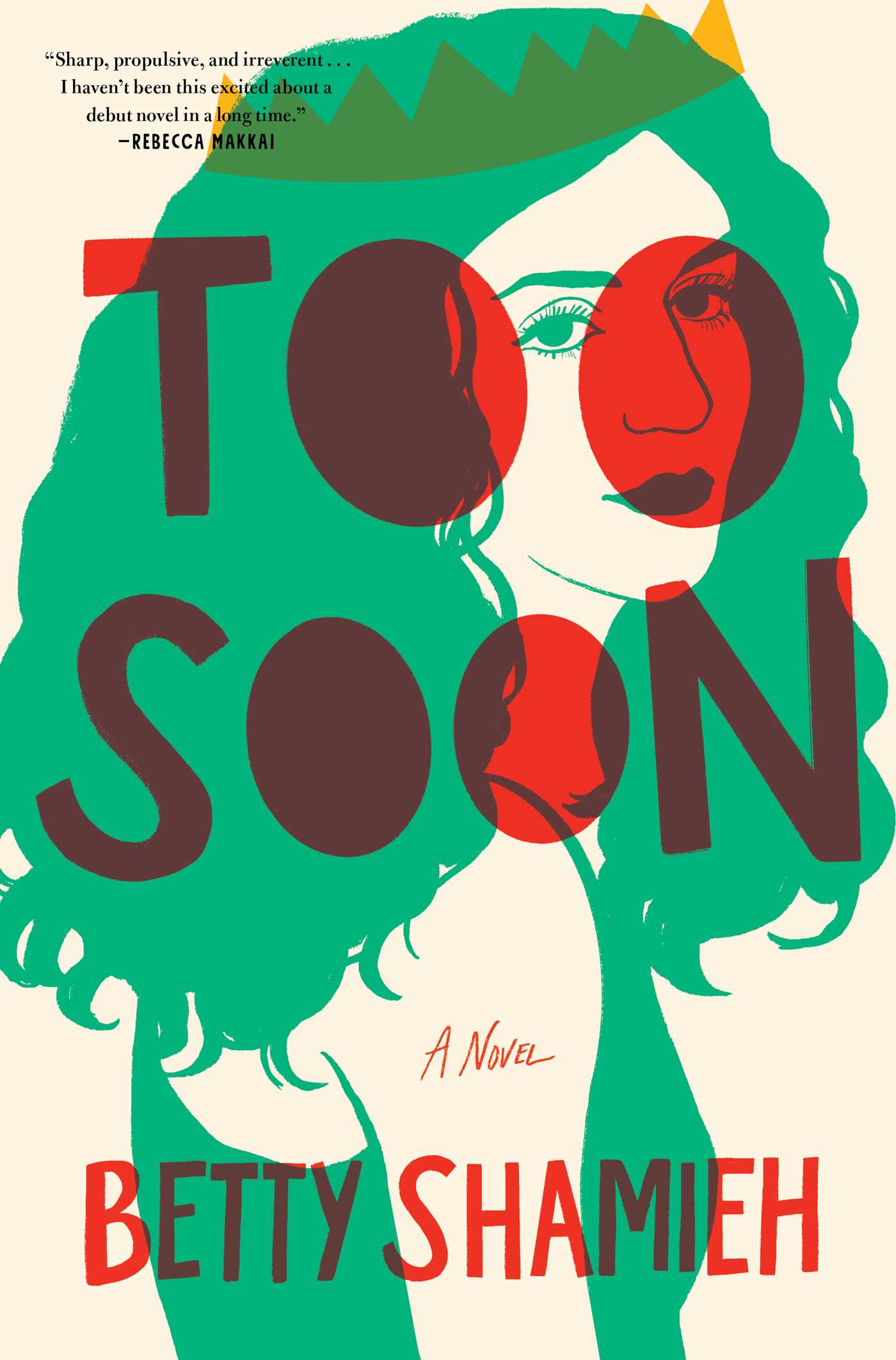 We met to discuss the book online with the author on Sunday, February 23rd at 1 pm Eastern/19:00 CET.
We met to discuss the book online with the author on Sunday, February 23rd at 1 pm Eastern/19:00 CET.
For readers of Pachinko and Queenie, a funny, sexy, and heart-wrenching literary debut that explores exile, ambition, and hope across three generations of Palestinian American women, Arabella, Zoya, and Naya.
Thirty-five-year-old Arabella, a New York theatre director whose dating and career prospects are drying up, is offered an opportunity to direct a risqué cross-dressing interpretation of a Shakespeare classic—that might garner international attention—in the West Bank. Her mother, Naya, and grandmother, Zoya, hatch a plot to match her with Aziz, a Palestinian American doctor volunteering in Gaza. Arabella agrees to meet Aziz, since her growing feelings for Yoav, a celebrated Israeli American theatre designer, seem destined for disaster…
With biting hilarity, Too Soon introduces us to a trio of bold and unforgettable voices. This dramatic saga follows one family’s epic journey fleeing war-torn Jaffa in 1948, chasing the American Dream in Detroit and San Francisco in the sixties and seventies, hustling in the New York theatre scene post-9/11, and daring to stage a show in Palestine in 2012. Upon learning one of them is living on borrowed time, the three women fight to live, make art, and love on their own terms. A funny, sexy, and heart-wrenching literary debut, Too Soon illuminates our shared history and asks, how can we set ourselves free?
Published by Simon & Schuster, 2025.
About the author:
Betty Shamieh is a Palestinian American writer and the author of fifteen plays. She is the playwright-in-residence at the Classical Theatre of Harlem. Her six New York play premieres include the sold-out off-Broadway runs of Roar and Malvolio, a sequel to Twelfth Night, which were both New York Times Critic’s Picks. Shamieh was awarded a Guggenheim Fellowship and named a UNESCO Young Artist for Intercultural Dialogue. She is a founding artistic director of The Semitic Root, a collective that supports innovative theatre co-created by Arab and Jewish Americans. A graduate of Harvard College and the Yale School of Drama, she lives with her family in San Francisco.
The January 2025 novel was Granada: the complete trilogy by Radwa Ashour
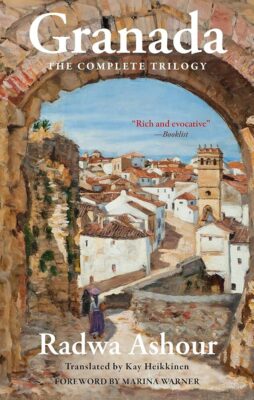 We met to discuss the book online with translator Kay Heikkinen on Sunday, January 26th at 1 pm Eastern/19:00 CET.
We met to discuss the book online with translator Kay Heikkinen on Sunday, January 26th at 1 pm Eastern/19:00 CET.
Named a top literary work of the 20th century by the Arab Writers’ Union, this multigenerational epic is set at the collapse of Muslim rule in Medieval Spain, available now for the first time in a new, complete translation.
Set in 1492, Granada is about an ordinary Muslim family who must survive the Christian conquest of Arabic Spain. As the Castilian forces enter Granada, Muslims are slowly stripped of their rights: confiscations, forced conversions, and expulsions.
As the triumphant new masters of Granada burn books, Abu Jaafar, a bookseller by trade, quietly moves his rich library out of town, while preparing for the marriage of his granddaughter Saleema to his apprentice Saad. The tangled lives of Abu Jaafar’s family, his descendants, and his community bear witness to the vanquishing of Muslim life.
Radwa Ashour’s sweeping trilogy, set over one hundred years against the backdrop of the great historical events of 16th century Europe, tells the story of those who remained in Andalusia, of the individuals who struggled to maintain faith and hope for a possible future. It narrates a community’s effort to comprehend what has happened to them, of their valiant but ultimately unsuccessful efforts to resist the destruction of their identity.
Published by Hoopoe, translated by Kay Heikkinen, 2024.
About the author and translator:
Radwa Ashour (1946–2014) is a highly acclaimed Egyptian writer and scholar. She is the author of more than fifteen works of fiction, memoir, and criticism, including Granada (AUC Press, 2008) and The Woman from Tantoura (AUC Press, 2014), and was a recipient of the Constantine Cavafy Prize for Literature and the prestigious Owais Prize for Fiction.
Kay Heikkinen is a translator and academic who holds a PhD from Harvard University. She was previously Ibn Rushd Lecturer of Arabic at the University of Chicago. Among other books, she has translated Naguib Mahfouz’s In the Time of Love, Radwa Ashour’s The Woman From Tantoura, and Huzama Habayeb’s Velvet, for which she was awarded the 2020 Saif-Ghobash Banipal Prize for Arabic Literary Translation. She lives in Seattle, Washington.
The November novel was Selamlik by Khaled Alesmael
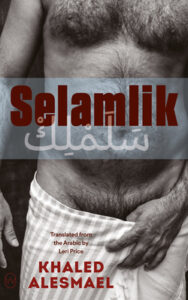 We met to discuss the book online with the author on Sunday, November 24th at 1 pm Eastern/19:00 CET.
We met to discuss the book online with the author on Sunday, November 24th at 1 pm Eastern/19:00 CET.
An unflinching story about Arab masculinity and homoeroticism.
Furat, a Syrian in his early 20s, visits Sibki Park in Damascus, one of the city’s most popular cruising areas. There he learns about the hammams, secret meeting places for gay men located throughout the old city. Inside these public baths, the air is thick with the scent of bay laurel soap, and naked men hide in the steam. Furat faces sometimes violent disapproval from all levels of society, religion, and the man in the street–and yet he manages to find the love he’s been seeking just before his world collapses and he’s forced to flee.
Selamlik is the story of Furat’s journey, along with that of other refugees. It’s a journey in which they face physical and economic hardship, draconian migration laws, and the unwelcome grief, shame, and hatred they’ve carried with them from their ever more distant pasts. Despite everything, Furat remains steadfast in his pursuit of passion, pleasure, and love.
Published by World Editions, translated by Leri Price, 2024 (pages 240).
The October novel was The Jinn Daughter by Rania Hanna
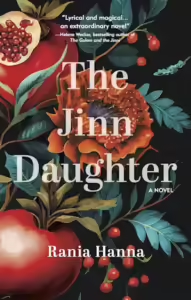 We met to discuss the book online with author Rania Hanna on Sunday, October 27th at 1 pm Eastern.
We met to discuss the book online with author Rania Hanna on Sunday, October 27th at 1 pm Eastern.
Nadine is a jinn tasked with one job: telling the stories of the dead. She rises every morning to gather pomegranate seeds—the souls of the dead—that have fallen during the night. With her daughter Layala at her side, she eats the seeds and tells their stories. Only then can the departed pass through the final gate of death.
But when the seeds stop falling, Nadine knows something is terribly wrong. All her worst fears are confirmed when she is visited by Kamuna, Death herself and ruler of the underworld, who reveals her desire for someone to replace her: it is Layala she wants.
Nadine will do whatever it takes to keep her daughter safe, but Kamuna has little patience and a ruthless drive to get what she has come for. Layala’s fate, meanwhile, hangs in the balance.
Rooted in Middle Eastern mythology, Rania Hanna deftly weaves subtle, yet breathtaking, magic through this vivid and compelling story that has at its heart the universal human desire to, somehow, outmaneuver death.
Published by AUC Press (Hoopoe), 274 pages.
The September novel was Stories from the Center of the World: New Middle East Fiction, edited by Jordan Elgrably
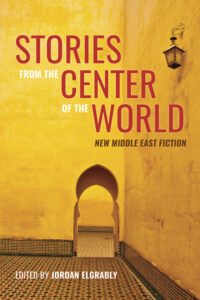 We met to discuss the book online on Sunday, September 29th at 1 pm Eastern/19:00 CET.
We met to discuss the book online on Sunday, September 29th at 1 pm Eastern/19:00 CET.
One of The Millions Most Anticipated Books for Spring!
Featured in Alta Magazine’s New Books for May!
Short stories from 25 emerging and established writers of Middle Eastern and North African origins, a unique collection of voices and viewpoints that illuminate life in the global Arab/Muslim world.
“Provocative and subtle, nuanced and surprising, these stories demonstrate how this complicated and rich region might best be approached–through the power of literature.”–Viet Thanh Nguyen, author of The Committed
Stories from the Center of the World gathers new writing from the greater Middle East (or SWANA), a vast region that stretches from Southwest Asia, through the Middle East and Turkey, and across Northern Africa. The 25 authors included here come from a wide range of cultures and countries, including Palestine, Syria, Pakistan, Iran, Lebanon, Egypt, and Morocco, to name some.
In “Asha and Haaji,” Hanif Kureishi takes up the cause of outsiders who become uprooted when war or disaster strikes and they flee for safe haven. In Nektaria Anastasiadou‘s “The Location of the Soul According to Benyamin Alhadeff,” two students in Istanbul from different classes — and religions that have often been at odds with one another — believe they can overcome all obstacles. MK Harb‘s story, “Counter Strike,” is about queer love among Beiruti adolescents; and Salar Abdoh‘s “The Long Walk of the Martyrs” invites us into the world of former militants, fighters who fought ISIS or Daesh in Iraq and Syria, who are having a hard time readjusting to civilian life. In “Eleazar,” Karim Kattan tells an unexpected Palestinian story in which the usual antagonists — Israeli occupation forces — are mostly absent, while another malevolent force seems to overtake an unsuspecting family. Omar El Akkad‘s “The Icarist” is a coming-of-age story about the underworld in which illegal immigrants are forced to live, and what happens when one dares to break away.
Contributors include: Salar Abdoh, Leila Aboulela, Farah Ahamed, Omar El Akkad, Sarah AlKahly-Mills, Nektaria Anastasiadou, Amany Kamal Eldin, Jordan Elgrably, Omar Foda, May Haddad, Danial Haghighi, Malu Halasa, MK Harb, Alireza Iranmehr, Karim Kattan, Hanif Kureishi, Ahmed Salah Al-Mahdi, Diary Marif, Tariq Mehmood, Sahar Mustafah, Mohammed Al-Naas, Ahmed Naji, Mai Al-Nakib, Abdellah Taia, and Natasha Tynes
Published by CityLights Books, 2024 (342 pages).
The July novel was The Oud Player of Cairo by Jasmin Attia (Sunday, July 28th)
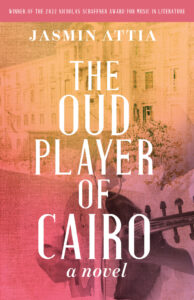 We met to discuss the book online on Sunday, July 28th at 1 pm Eastern/19:00 CET.
We met to discuss the book online on Sunday, July 28th at 1 pm Eastern/19:00 CET.
Vibrantly descriptive and evocative of the waning colonial world in Egypt during the mid-20th century, this debut historical novel by Jasmin Attia is the compelling story of a young Egyptian woman, Laila, who defies the restrictive traditional roles set for women of that time, and instead follows the path inspired by her musician father, a much-beloved oud player, to become a singer and performer In her own right.
After extricating herself from an abusive marriage, Laila struggles to maintain her independence as a singer in Cairo’s chic international nightclubs, and embarks on an affair that puts her in grave danger, forcing her to make a decision that will forever alter the course of her life.
Published by Schaffner Press, 360 pages.
The June 2024 novel was On the Isle of Antioch by Amin Maalouf, translated by Natasha Lehrer
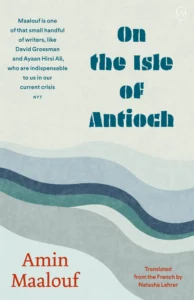
In this dystopian novel about total collapse by internationally renowned author Amin Maalouf, a complete blackout hits a small island with only two solitary inhabitants, who suddenly have to depend on each other.
Alec, a press artist with an impressive track record, settles on a remote island in the Atlantic Ocean. He has little contact with his neighbor, a solitary woman who wrote a cult book years ago, before withdrawing from public life. That is, until a gigantic power failure cuts them off from the rest of the world, and all of a sudden they find themselves dependent on each other. The world appears to be on the brink of nuclear war and the collapse of civilization seems imminent. Just who are the mysterious friends of Empedocles, the gang of otherworldly protectors who came swooping in to interfere with the US presidency and cure all illness? Should we trust them? On the Isle of Antioch is a suspenseful novel with mythological roots, written in the dreamy language of the classics, by internationally renowned scholar Amin Maalouf.
Published by World Editions. We met to talk about the book online on Sunday, June 30th at 1 pm Eastern/19:00 CET.
About the author:
AMIN MAALOUF was born in Beirut and lived there until the Lebanese Civil War broke out in 1975. He settled in Paris in 1976 and published his first book, The Crusades Through Arab Eyes, in 1983. In 1993, The Rock of Tanios, his fifth novel, won the Goncourt Prize, the most prestigious literary award in France. Maalouf is a member of the Académie Française and in 2010 was awarded the Prince of Asturias Award for Literature for his entire oeuvre. In 2021 he was voted one of 12 International Writers by the Royal Society of Literature, an initiative celebrating the power of literature to transcend borders and bring people together. He was awarded both the Terzani Prize and the Malaparte Prize for Adrift, also published in English by World Editions. His work has been translated into 50 languages and his most recent bestselling novel available in English is The Disoriented.
About the translator:
NATASHA LEHRER is a prizewinning writer, translator, and editor. Her long-form journalism and book reviews have appeared in the Guardian, the Observer, the Times Literary Supplement, the Nation, Haaretz, and Fantastic Man, among others, and she is literary editor of the Jewish Quarterly. She has contributed to several books, including a chapter on France in Looking for an Enemy: 8 Essays on Antisemitism, edited by Jo Glanville. The writers she has translated include Nathalie Léger, Chantal Thomas, Vanessa Springora, Victor Segalen, Robert Desnos, and Georges Bataille.
See book club questions HERE.
The May 2024 novel was Where the Wind Calls Home by Samar Yazbek, translated by Leri Price
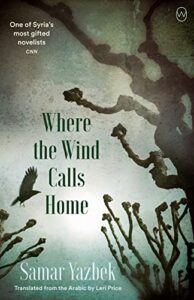
In this new novel by Syria’s most prominent writer of the National Book Award Finalist Planet of Clay, a wounded nineteen-year-old soldier in the Syrian Army remembers his life lived in the traditional Alawite way.
Ali, a nineteen-year-old soldier in the Syrian army, lies on the ground beneath a tree. He sees a body being lowered into a hole–is this his funeral? There was that sudden explosion, wasn’t there … While trying to understand the extend of the damage, Ali works his way closer to the tree. His ultimate desire is to fly up to one of its branches, to safety. Through rich vignettes of Ali’s memories, we uncover the hardships of his traditional Syrian Alawite village, but also the richness and beauty of its cultural and religious heritage. Yazbek here explores the secrets of the Alawite faith and its relationship to nature and the elements in a tight poetic novel dense with life and hope and love.
Published by World Editions. We met to discuss the book together online on Wednesday, May 29th at 1 pm Eastern/19:00 CET.
About the author:
Samar Yazbek is a Syrian writer, novelist, and journalist. She was born in Jableh in 1970 and studied literature before beginning her career as a journalist and a scriptwriter for Syrian television and film. Her novel Planet of Clay, also published by World Editions, was a finalist for the National Book Award and longlisted for the Warwick Women in Translation Prize. Her accounts of the Syrian conflict include A Woman in the Crossfire: Diaries of the Syrian Revolution and The Crossing: My Journey to the Shattered Heart of Syria. Yazbek’s work has been translated into multiple languages and has been recognized with numerous awards—notably, the French Best Foreign Book Award and the PEN-Oxfam Novib, PEN Tucholsky, and PEN Pinter awards. She was recently selected to be part of the International Writers Program with the Royal Society of Literature.
About the translator:
Leri Price is an award-winning literary translator of contemporary Arabic fiction. She has twice been a Finalist for the National Book Award for Translated Literature, in 2021 for her translations of Samar Yazbek’s Planet of Clay, and in 2019 for Khaled Khalifa’s Death is Hard Work. Her translation of Khalifa’s Death is Hard Work also won the 2020 Saif Ghobash Banipal Prize for Arabic Literary Translation.
See book club questions HERE.
Read an excerpt of the book HERE.
The April 2024 novel was A Nearby Country Called Love: A Novel by Salar Abdoh
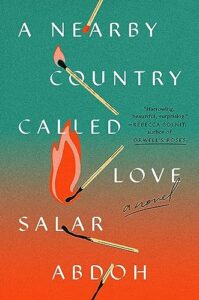
A sweeping, propulsive novel about the families we are born into and the families we make for ourselves, in which a man struggles to find his place in an Iran on the brink of combusting
Amid the alleyways of the Zamzam neighborhood of Tehran, a woman lights herself on fire in a desperate act of defiance, setting off a chain reaction of violence and protest. Haunted by the woman’s death, Issa is forced to confront the contradictions of his own family history, throughout which his late brother Hashem, a prominent queer artist in Tehran’s underground, defied their father, a skilled martial artist bound to traditional notions of honor and masculinity.
Issa soon finds himself thrown into a circle of people living on the margins of society, negotiating a razor-like code of conduct that rewards loyalty and encourages aggression and intolerance in equal measure. As the city explodes around him, Issa realizes that it is the little acts of kindness that matter most, the everyday humanity of individuals finding love and doing right by one another.
Vibrant and evocative, intimate and intelligent, A Nearby Country Called Love is both a captivating window into contemporary Iran and a portrait of the parallel fates of a man and his country—a man who acknowledges the sullen and rumbling baggage of history but then chooses to step past its violent inheritance.
Published by Viking. We met to talk about the book online on Wednesday, April 24th at 1 pm Eastern/19:00 CET.
About the author:
Salar Abdoh was born in Iran and splits his time between Tehran and New York City. He is the author of the novels Tehran at Twilight, The Poet Game, Opium, and Out of Mesopotamia and the editor of Tehran Noir. He teaches in the MFA program at the City College of New York.
Listen to a sample of the book HERE.
Read an excerpt of the novel HERE.
The March 2024 novel was The Applicant by Nazli Koca
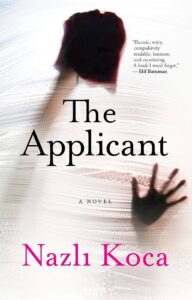
It’s 2017 and Leyla, a Turkish twenty-something living in Berlin is scrubbing toilets at an Alice in Wonderland-themed hostel after failing her thesis, losing her student visa, and suing her German university in a Kafkaesque attempt to reverse her failure.
Increasingly distant from what used to be at arm’s reach—writerly ambitions, tight knit friendships, a place to call home—Leyla attempts to find solace in the techno beats of Berlin’s nightlife, with little success. Right as the clock winds down on the hold on her visa, Leyla meets a conservative Swedish tourist and—against her political convictions and better judgment—begins to fall in love, or something like it. Will she accept an IKEA life with the Volvo salesman and relinquish her creative dreams, or return to Turkey to her mother and sister, codependent and enmeshed, her father’s ghost still haunting their lives?
While she waits for the German court’s verdict on her future, in the pages of her diary, Leyla begins to parse her unresolved past and untenable present. An indelible character at once precocious and imperiled, Leyla gives voice to the working-class and immigrant struggle to find safety, self-expression, and happiness. The Applicant is an extraordinary dissection of a liminal life between borders and identities, an original and darkly funny debut.
Published by Grove Atlantic. We met to discuss the book online on Sunday, Mar. 31st at 1 pm Eastern/19:00 CET.
About the author:
Nazlı Koca is a writer and poet from Turkey who now lives in the US. Her writing has appeared in the Threepenny Review, Bookforum, and Second Factory, among other outlets. The Applicant is her first novel.
Check out the reading group guide HERE.
The February ’24 book was Woman Life Freedom: Voices and Art from the Women’s Protest in Iran, edited by Malu Halasa
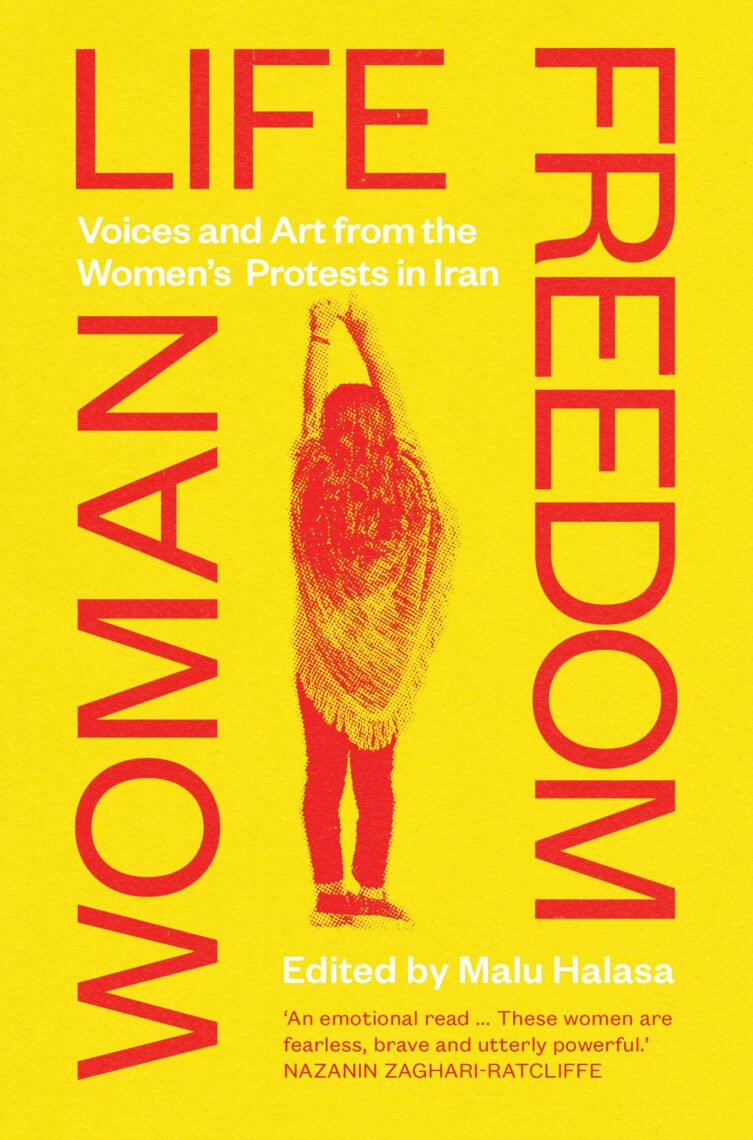 We are on the one-year anniversary of the women’s freedom marches in Iran.
We are on the one-year anniversary of the women’s freedom marches in Iran.
Jina Mahsa Amini’s death at the hands of Iran’s Morality Police on 16th of September, 2022 sparked widespread protests across the country. Women took to the streets, uncovering their hair, burning headscarves and chanting “Woman Life Freedom’ — ‘Zan Zendegi Azadi” in Persian and “Jin Jîyan Azadî” in Kurdish — in mass demonstrations. An explosion of creative resistance followed as art and photography shared online went viral and people around the world saw what was really going on in Iran.
Woman Life Freedom captures this historic moment in artwork and first-person accounts. This striking collection goes behind the scenes at forbidden fashion shows; records the sound of dissent in Iran where it is illegal for women to sing unaccompanied in public; and walks the streets of Tehran with ‘The Smarties’ — Gen Z women who colour and show their hair in defiance of the authorities, despite the potentially devastating consequences. Extolling the power of art, writing and body politics — both female and queer — this collection is a universal rallying call and a celebration of the women the regime has tried and failed to silence.
Published by Saqi Books, London. We met the editor, Malu Halasa, to talk about the book online, on Sunday, Feb. 25 at 1 pm Eastern/19:00 CET.
The January ’24 book was Traces of Enayat, by Iman Mersal
Traces of Enayat is an extraordinary, beautiful book…
Selma Dabbagh, The Markaz Review
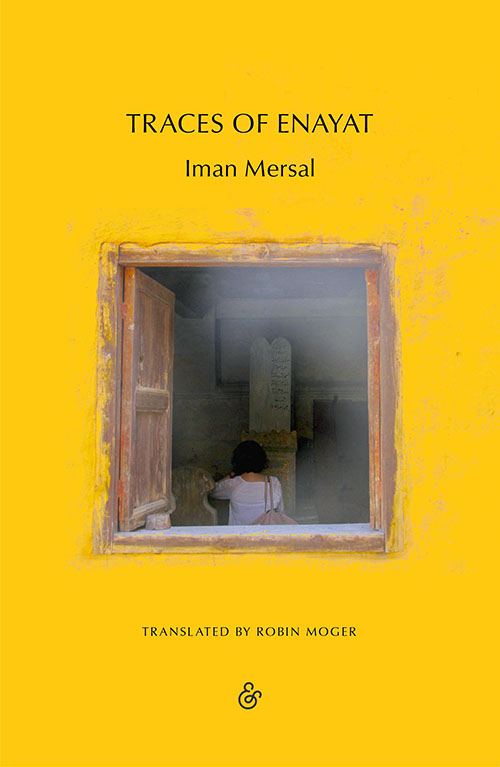
Cairo, 1963: Enayat al-Zayyat’s suicide becomes a byword for talent tragically cut down, even as Love and Silence, her only novel, languishes unpublished. Four years after al-Zayyat’s death, the novel will be brought out, adapted for film and radio, praised, and then, cursorily, forgotten. For the next three decades it’s as if al-Zayyat never existed.
Yet when poet Iman Mersal stumbles across Love and Silence in the nineties, she is immediately hooked. Who was Enayat? Did the thought of her novel’s rejection really lead to her suicide? Where did this startling voice come from? And why did Love and Silence disappear from literary history? To answer these questions, Mersal traces Enayat’s life, interviews family members and friends, reconstructs the afterlife of Enayat in the media, and tracks down the flats, schools, archaeological institutes, and sanatoriums among which Enayat divided her days. Touching on everything from dubious antidepressants to domestic abuse and divorce law, from rubbish-strewn squats in the City of the Dead to the glamour of golden-age Egyptian cinema, this wide-ranging, unclassifiable masterpiece gives us a remarkable portrait of a woman artist striving to live on her own terms.
Published by And Other Stories in the UK. We met to discuss the book on Sunday, Jan. 28 at 1 pm Eastern/19:00 CET.
The November ’23 book was Palestine +100: stories from a century after the Nakba
Edited by Basma Ghalayini. Featuring: Talal Abu Shawish, Anwar Hamed, Tasnim Abutabikh, Selma Dabbagh, Emad El-Din Aysha, Samir El-Youssef, Saleem Haddad, Majd Kayyal, Mazen Maarouf, Abdalmuti Maqboul, Ahmed Masoud & Rawan Yaghi
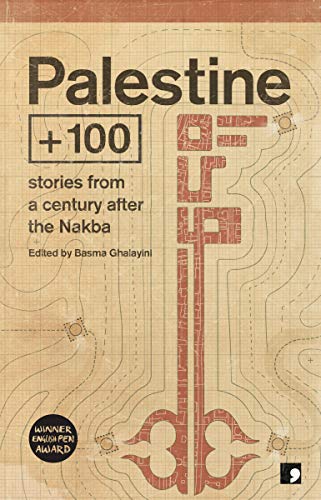
Palestine + 100: stories from a century after the Nakba poses a question to 12 Palestinian writers: what might your country look like in the year 2048 — a century after the tragedies and trauma of what has come to be called the Nakba. How might this event — which, in 1948, saw the expulsion of over 700,000 Palestinian Arabs from their homes — reach across a century of occupation, oppression, and political isolation, to shape the country and its people? Will a lasting peace finally have been reached, or will future technology only amplify the suffering and mistreatment of Palestinians?
Covering a range of approaches — from sci-fi noir, to nightmarish dystopia, to high-tech farce — these stories use the blank canvas of the future to reimagine the Palestinian experience today. Along the way, we encounter drone swarms, digital uprisings, time-bending VR, peace treaties that span parallel universes, and even a Palestinian superhero, in probably the first anthology of science fiction from Palestine ever.
Translated from the Arabic by Raph Cormack, Mohamed Ghalaieny, Andrew Leber, Thoraya El-Rayyes, Yasmine Seale and Jonathan Wright. Published by Comma Press in the UK. We met to discuss the book with host Rana Asfour and special guest writers on Sunday, Nov. 26 at 1 pm Eastern/19:00 CET.
The Oct ’23 selection was the novel No One Prayed Over Their Graves by Khaled Khalifa
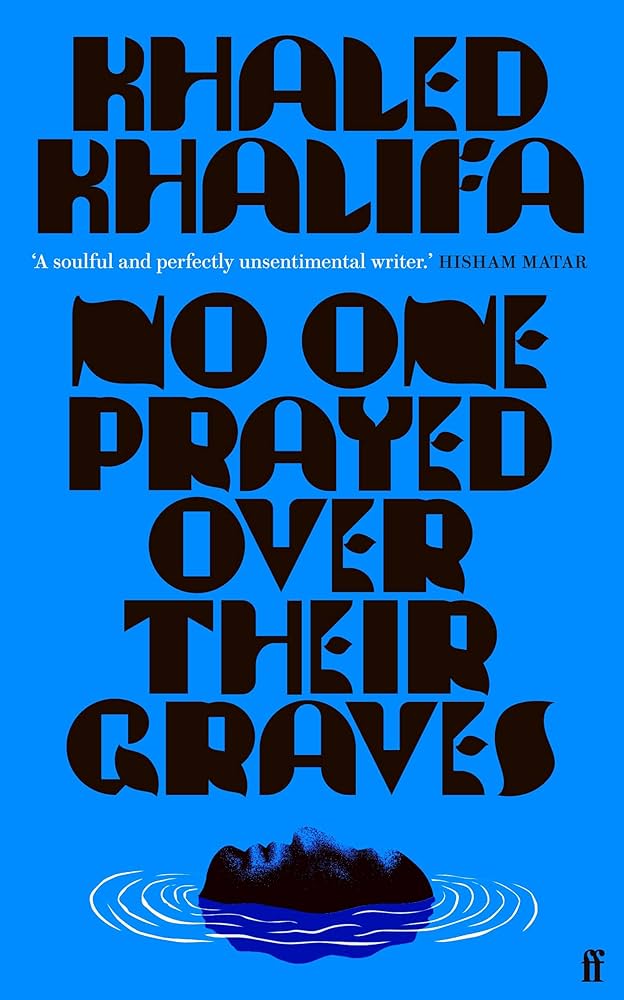 LONGLISTED FOR THE 2023 NATIONAL BOOK AWARD FOR TRANSLATED FICTION
LONGLISTED FOR THE 2023 NATIONAL BOOK AWARD FOR TRANSLATED FICTION
“Gorgeous . . . Lush, elegiac [and] Márquezian . . . A novel of abundance and generosity.” —Sarah Cypher, The Washington Post
“Richly embroidered . . . [Khalifa’s] galloping narration restores life and soul to a city that has become a byword for devastation.” —The Economist
From the National Book Award finalist Khaled Khalifa, the story of two friends whose lives are altered by a flood that devastates their Syrian village.
On a December morning in 1907, two close friends, Hanna and Zakariya, return to their village near Aleppo after a night of drunken carousing in the city, only to discover that there has been a massive flood. Their neighbors, families, children—nearly all of them are dead. Their homes, shops, and places of worship are leveled. Their lives will never be the same.
Hanna was once a wealthy libertine, a landowner who built a famed citadel devoted to the pursuit of pleasure and excess. But with the loss of his home, wife, and community, he transforms, becoming an ascetic mystic obsessed with death and the meaning of life. In No One Prayed Over Their Graves, we follow Hanna’s life before and after the flood, tracing friendships, loves and lusts, family and business, until he is just one thread in the rich tapestry of Aleppo.
Khaled Khalifa weaves a sweeping tale of life and death in the hubbub of Aleppine society at the turn of the twentieth century. No One Prayed Over Their Graves is a portrait of a people on the verge of great change—from provincial villages to the burgeoning modernity of the city, where Christians, Muslims, and Jews live and work together, united in their love for Aleppo and their dreams for the future.
Published by MacMillan in the US and Faber in the UK. We met to discuss the book on Sunday, Oct. 29 at 2 pm Eastern/19:00 CET.
The September 2023 novel was River Spirit by Leila Aboulela
(from a rave review in the New York Times) “In 19th-century Sudan, with the Ottoman Empire fading and Britain gaining influence in the region, a religious leader proclaims himself the Mahdi, or the redeemer. He aims to correct the wrongs — excessive taxation, for one — of the foreign rulers. But as the revolution gains strength, and the Mahdi collects followers, his greed for power tarnishes the movement’s ideological purity. Leila Aboulela’s dazzling new novel, River Spirit, follows the course of that revolution as it turns into a new instrument of oppression.”
River Spirit is the unforgettable story of a people who, against the odds and for a brief time, gained independence from foreign rule. This is a powerful tale of corruption and unshakeable devotion — to a cause, to one’s faith and to the people who become family.
We met to talk about the book on the last Sunday in Sept., the 24th, at 1 pm Eastern/19:00 CET.
The August 2023 novel was A Stranger in Baghdad by Elizabeth Loudon
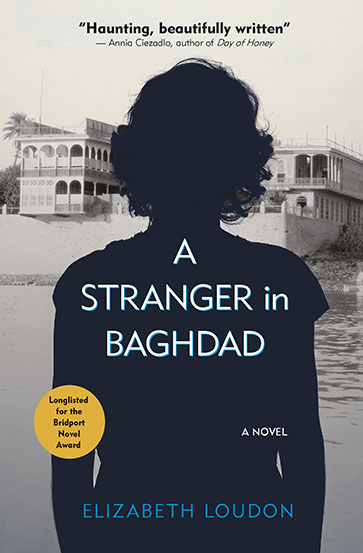 In beautifully rendered prose, a mother and a daughter struggle as outsiders in Baghdad and London in this intergenerational drama set against a background of political tension and intrigue
In beautifully rendered prose, a mother and a daughter struggle as outsiders in Baghdad and London in this intergenerational drama set against a background of political tension and intrigue
“Who would be charmed by tales of life in the beautiful old house on the banks of the Tigris—looted now no doubt, its shutters torn and the courtyard strewn with mattresses?”
One night in 2003, Anglo-Iraqi psychiatrist Mona Haddad has a surprise visitor to her London office, an old acquaintance Duncan Claybourne. But why has he come? Will his confession finally lay bare what happened to her family before they escaped Iraq?
Their stories begin in 1937, when Mona’s mother Diane, a lively Englishwoman newly married to Ibrahim, an ambitious Iraqi doctor, meets Duncan by chance. Diane is working as a nanny for the Iraqi royal family. Duncan is a young British Embassy officer in Baghdad. When the king dies in a mysterious accident, Ibrahim and his family suspect Diane of colluding with Duncan and the British.
Summoning up the vanished world of mid-twentieth-century Baghdad, Elizabeth Loudon’s richly evocative story of one family calls into question British attitudes and policies in Iraq and offers up a penetrating reflection on cross-cultural marriage and the lives of women caught between different worlds.
To read an excerpt, click here.
We met to talk about the book and discuss it with Elizabeth Louden on Sunday August 27th, 2023.
The July 2023 reading selection was Emissaries, short stories by Youssef Rakha
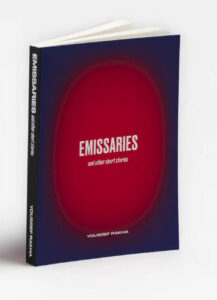
Emissaries is the new collection of short stories by renowned Egyptian author Youssef Rakha. Many of the stories have appeared previously in journals from the UK, US and the Middle East region. In these Cairo-focused stories written at the height of the Arab Spring, in its wake and its ruins, the reader is led by a colorful cast of characters through a hypnagogic urbanscape pulsating with the specters of post-political Islam and failed revolution.
Writes TMR reviewer Zein El-Amine, “I have not read many works by Arab American writers writing in English, but Rakha’s collection is original, irreverent, and provocative. What engages one most in reading his stories is the language he employs. Even though he is referencing Western pop culture and writers throughout the book, his voice is original. In wielding such prose, Rakha is a pied piper leading the reader into his rabbit holes. The consistency in that voice and the recurring motifs in the book make for a solid read.” Read the review. Get the audio book. Print.
We met to discuss these stories with Youssef Rakha on Sunday, July 2nd, 2023.
 The June 2023 BookGroup Selection was Enter Ghost, a novel by Isabella Hammad
The June 2023 BookGroup Selection was Enter Ghost, a novel by Isabella Hammad
Enter Ghost follows actress Sonia as she returns to Palestine and takes a role in a West Bank production of Hamlet. After years away from her family’s homeland, and reeling from a disastrous love affair, Sonia Nasir returns to Haifa to visit her older sister Haneen. This is her first trip back since the second intifada and the deaths of their grandparents: while Haneen made a life here commuting to Tel Aviv to teach at the university, Sonia remained in London to focus on her acting career and now dissolute marriage. On her return, she finds her relationship to Palestine is fragile, both bone-deep and new.
At Haneen’s, Sonia meets the charismatic and candid Mariam, a local director, and finds herself roped into a production of Hamlet in the West Bank. Sonia is soon rehearsing Gertude’s lines in Classical Arabic and spending more time in Ramallah than Haifa, along with a dedicated group of men from all over historic Palestine who, in spite of competing egos and priorities, each want to bring Shakespeare to that side of the wall. As opening night draws closer it becomes clear just how many violent obstacles stand before a troupe of Palestinian actors. Amidst it all, the life Sonia once knew starts to give way to the daunting, exhilarating possibility of finding a new self in her ancestral home.
A stunning rendering of present-day Palestine, Enter Ghost is a story of diaspora, displacement, and the connection to be found in family and shared resistance. Timely, thoughtful, and passionate, Isabella Hammad’s highly anticipated second novel is an exquisite feat, an unforgettable story of artistry under occupation.
 April 2023 Book Club Selection was Waiting for the Past, a novel by Hadiya Hussein, translated from the Arabic by Barbara Romaine
April 2023 Book Club Selection was Waiting for the Past, a novel by Hadiya Hussein, translated from the Arabic by Barbara Romaine
Hadiya Hussein’s poignant novel plunges readers into a haunting and powerful story of resilience. Set at the end of Saddam Hussein’s brutal reign, the novel follows Narjis, a young Iraqi woman, on her quest to discover what has become of the man she loves. Yusef, suspected by the regime of being a dissident, has disappeared–presumably either imprisoned or executed. On her journey, Narjis receives shelter from a Kurdish family who welcome her into their home where she meets Umm Hani, an older woman who is searching for her long-lost son. Together they form a bond, and Narjis comes to understand the depth of loss and grief of those around her. At the same time, she is introduced to the warm hospitality of the Kurdish community, settling into their everyday lives, and embracing their customs. Barbara Romaine’s translation skillfully renders this complex, layered story, giving readers a stark yet beautiful portrait of contemporary Iraq.
 March 2023 Selection was The Girl Who Fell to Earth, a memoir by Sophia Al-Maria (discussing the book on Sunday, March 26, 12 ET/18:00 CET).
March 2023 Selection was The Girl Who Fell to Earth, a memoir by Sophia Al-Maria (discussing the book on Sunday, March 26, 12 ET/18:00 CET).
Award-winning filmmaker and writer Sophia Al-Maria’s The Girl Who Fell to Earth is a funny and wry coming-of-age memoir about growing up in between American and Gulf Arab cultures. Part family saga and part personal quest, The Girl Who Fell to Earth traces Al-Maria’s journey to make a place for herself in two different worlds.
When Sophia Al-Maria’s mother sends her away from rainy Washington State to stay with her husband’s desert-dwelling Bedouin family in Qatar, she intends it to be a sort of teenage cultural boot camp. What her mother doesn’t know is that there are some things about growing up that are universal. In Qatar, Sophia is faced with a new world she’d only imagined as a child. She sets out to find her freedom, even in the most unlikely of places.
The Girl Who Fell to Earth takes readers from the green valleys of the Pacific Northwest to the dunes of the Arabian Gulf and on to the sprawling chaos of Cairo. Struggling to adapt to her nomadic lifestyle, Sophia is haunted by the feeling that she is perpetually in exile: hovering somewhere between two families, two cultures, and two worlds. She must make a place for herself—a complex journey that includes finding young love in the Arabian Gulf, rebellion in Cairo, and, finally, self-discovery in the mountains of Sinai.
The Girl Who Fell to Earth heralds the arrival of an electric new talent and takes us on the most personal of quests: the voyage home.
 February 2023 Selection was Disoriental, the novel by Négar Djavadi.
February 2023 Selection was Disoriental, the novel by Négar Djavadi.
The story of a young girl and her family, at the core of an exploration of Iranian history.
Kimiâ Sadr fled Iran at the age of ten in the company of her mother and sisters to join her father in France. Now twenty-five, with a new life and the prospect of a child, Kimiâ is inundated by her own memories and the stories of her ancestors, which reach her in unstoppable, uncontainable waves. In the waiting room of a Parisian fertility clinic, generations of flamboyant Sadrs return to her, including her formidable great-grandfather Montazemolmolk, with his harem of fifty-two wives, and her parents, Darius and Sara, stalwart opponents of each regime that befalls them.
In this high-spirited, kaleidoscopic story, key moments of Iranian history, politics, and culture punctuate stories of family drama and triumph. Yet it is Kimiâ herself—punk-rock aficionado, storyteller extraordinaire, a Scheherazade of our time, and above all a modern woman divided between family traditions and her own “disorientalization”—who forms the heart of this bestselling and beloved novel.
January 2023 Book Club Selection was the novel Out of Mesopotamia, by Salar Abdoh
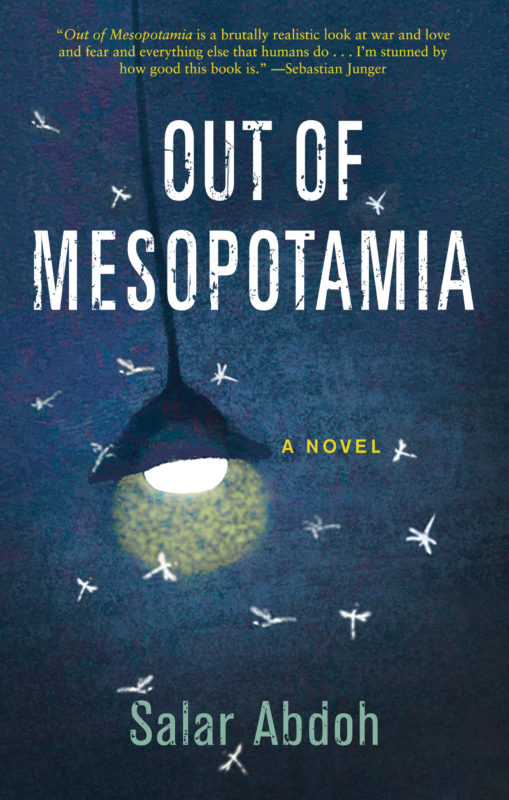
“Imagine getting into Iraq and Syria as an observer of the war on ISIS, and yet very soon after you’ve been close enough to RPGs to smell the explosion and feel the ground shake, you find yourself back in your old life, giving literary readings at swank bookstores in cities at peace, or attending highbrow academic conferences where nobody’s dying, except perhaps bored audience members. Juxtaposing the two realities — one savage and ridiculous, the other sane and predictable — is what the author is after in Out of Mesopotamia.” —Jessica Proett, The Markaz Review
Nov 2022 Book Club Selection was I Will Never See the World Again, by Ahmet Altan
The destiny I put down in my novel has become mine. I am now under arrest like the hero I created years ago. I await the decision that will determine my future, just as he awaited his. I am unaware of my destiny, which has perhaps already been decided, just as he was unaware of his. I suffer the pathetic torment of profound helplessness, just as he did.
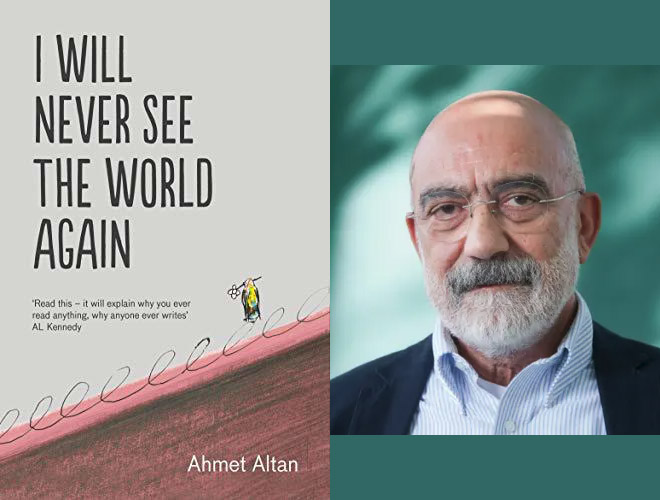 Like a cursed oracle, I foresaw my future years ago not knowing that it was my own.
Like a cursed oracle, I foresaw my future years ago not knowing that it was my own.
Confined in a cell four meters long, imprisoned on absurd, Kafkaesque charges, novelist Ahmet Altan is one of many writers persecuted by Recep Tayyip Erdogan’s oppressive regime. In this extraordinary memoir, written from his prison cell, Altan reflects upon his sentence, on a life whittled down to a courtyard covered by bars, and on the hope and solace a writer’s mind can provide, even in the darkest places. Turkey in the last several years has become one of the greatest oppressors of writers, academics and intellectuals, with the largest prison population of political detainees in continental Europe. Erdoğan, consolidating his power, has fired over 5,000 academics and 50,000 schoolteachers, whose progressive politics or Kurdish heritage he disliked, or who as journalists/editors/publishers have been too outspoken, such as widely translated novelist and newspaper editor Ahmet Altan, 72. The author of such internationally admired works as the novels in his Ottoman Quartet, Altan was sentenced to life in prison in 2016. He spent four years behind bars but was unexpectedly released last year. He said recently, “Prison didn’t extinguish my desire to write.”
Find it on Goodreads.
Sunday, Nov. 27th.
Oct 2022 Selection was The Last White Man, by Mohsin Hamid
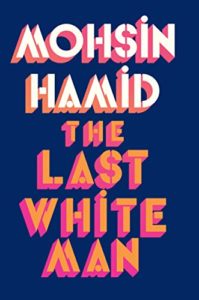
The Guardian calls Mohsin Hamid’s new novel “a hypnotic race fable,” in which “as white people suddenly awake in brown skin, they are forced to confront uncomfortable truths about power and identity.”
“One morning Anders, a white man, woke up to find he had turned a deep and undeniable brown.” So begins Mohsin Hamid’s inventive new novel, The Last White Man. Anders, as it turns out, is not an isolated case. More people in an unnamed town begin to change, including Oona, a yoga instructor and a friend of Anders. Violence inevitably erupts around them. White vigilante gangs terrorize the transformed, while some doggedly refuse to accept an end to whiteness.
At its heart, this is a novel about seeing, being seen, loss and letting go. The loss of privilege that comes from being perceived as white, and no longer being able to view the world from within whiteness, are some of the anxieties examined here.
(From The Guardian review by Guy Gunaratne.)
Sunday, Oct. 30th.
When you live in a conservative society, you run the risk of censure. How far should a philosophy professor stick her neck out to make a point? Would you put it all on the line in the pursuit of truth or justice, or whatever informs your intent?
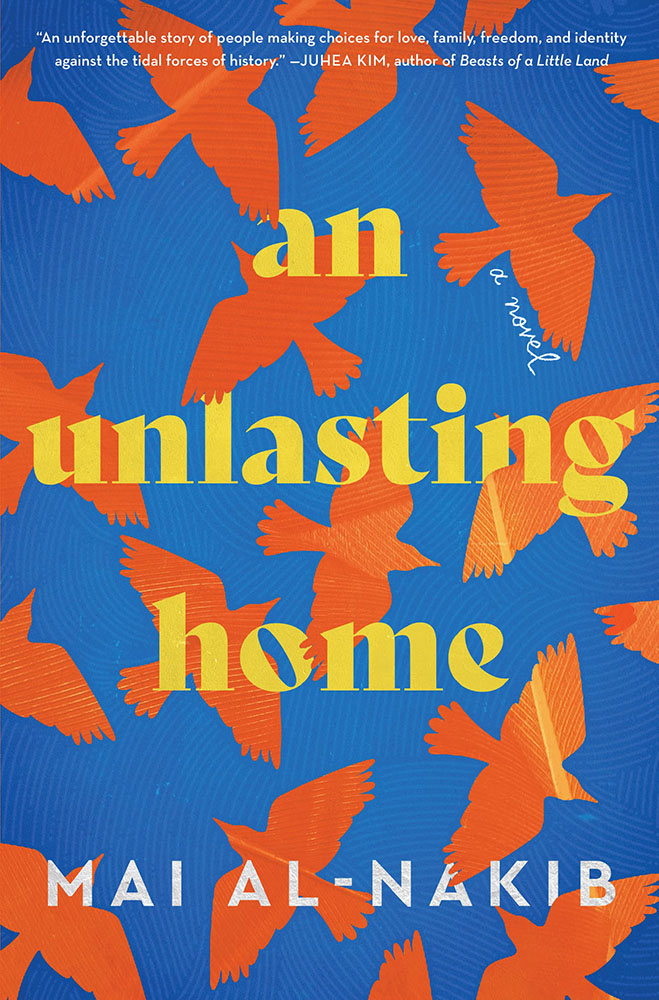
An Unlasting Home, by award-winning short story writer Mai Al-Nakib, opens in the summer of 2013. Sara Tarek Al-Ameed, a professor of philosophy at the Kuwait University for eleven years, is in the midst of preparing a paper arguing the importance of supplementing the religious curriculum with an early introduction to philosophy at the level of primary public school education in Kuwait. However, a phone recording by one of the munaqaba girls in her intro to philosophy class (in which she is heard arguing that “God is dead”) has been passed on to the most conservative member of the Kuwaiti Parliament — a Salafi, who has filed a complaint. Sara is arrested at her home and charged with blasphemy, a capital crime that comes with the threat of execution, under the newly amended Kuwaiti penal code. In the author’s note, Al-Nakib explains that although such an amendment did in fact come to pass by a wide majority of the elected parliament in 2013, the Emir of Kuwait, who holds authority over all amendments of laws, rejected it. This work of fiction, explains the author, imagines otherwise. (From the review by Rana Asfour.)
Sunday, Sept. 25, with novelist Mai Al-Nakib.
August 2022 Selection was The Handsome Jew, by Ali Al-Muqri, translated by Mbarek Sryfi
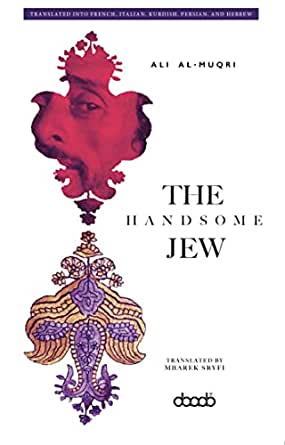
The Handsome Jew is a challenging and provocative novel that urges/ invites Muslims and Jews to contemplate themselves and the way they see the other through a doomed love story. This powerful novel tells the tragic saga of two lovers, Salem, a Jew, and Fatima, a Muslim, who fall in a forbidden, intense, and passionate love against all circumstances designed to divide them in a society bound by religion. This boundary-crossing love story epitomises the doomed relationship between Jews and Muslims in Yemen, sheds light on how each community sees the other, interrogates religious and social barriers, and proves that, against all odds, love can conquer all – OR till death do the fated couple part. (Goodreads).
July 2022 Book Club selection was The Best Place on Earth, by Ayelet Tsabari
On Sunday, July 31st, we talked about the short stories of Ayelet Tsabari in The Best Place on Earth.
June 2022 Selection were the short stories in TMR 22
The Markaz Review runs an international book club that meets on Zoom every last Sunday of the month. Readers from Los Angeles to Abu Dhabi share thoughts and insights on the month’s selection. Frequently, the author (and sometimes their translator) joins the group during the second half of the hour. Our bookgroup always meets the last Sunday at 1 pm Eastern.
On Sunday, June 26th, we talked about the short stories included in TMR 22 • STORIES, by such writers as Hanif Kureishi, Joumana Haddad, Karim Kattan, Ahmed Naji, Mai Al-Nakib, Nektaria Anastasiadou, Sarah Kahly-Mills and others.
The May 2022 Book Club selection was The Go-Between, a memoir by Osman Yousefzada
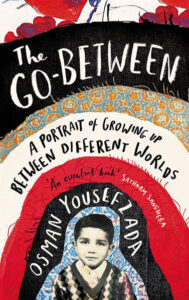
“A beautifully observed and funny book” Guardian “Compelling and humane” Sathnam Sanghera
A coming-of-age story set in Birmingham in the 1980s and 1990s, The Go-Between opens a window into a closed migrant community living in a red-light district on the wrong side of the tracks.
The adult world is seen through Osman’s eyes as a child: his own devout Pashtun patriarchal community, with its divide between the world of men and women, living cheek-by-jowl with parallel migrant communities. The orthodox attend a mosque down the road from the prostitutes and pimps. Children balance Western school teachings with cultural traditions.
Book Review: “The Go-Between” by Osman Yousefzada
The April 2022 selection was The Monotonous Chaos of Existence, stories by Hisham Bustani
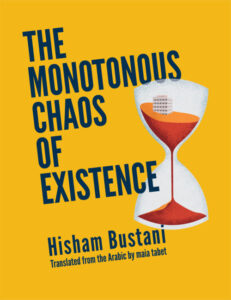
The stories within Hisham Bustani’s The Monotonous Chaos of Existence explore the turbulent transformation in contemporary Arab societies. With a deft and poetic touch, Bustani examines the interpersonal with a global lens, connects the seemingly contradictory, and delves into the ways that international conflict can tear open the individuals that populate his world—all while pushing the narrative form into new and unexpected terrain.
“These stories recall the rhythms of poetry, offer up the intimacy of memoir, and often feel more like films than fiction. The Monotonous Chaos of Existence got me thinking about similarly semi-surreal and ecstatic truth tellers Denis Johnson and Chester Himes, a comparison that will have to do for now because I’m still dizzy and not exactly thinking straight after reading these interrogations of the cruelty and absurdity of occupation and so-called post-colonialism. Clear-eyed personal/political storytelling that is exciting, askew, and challenging.”
—Brandon Soderberg, coauthor, I Got a Monster: The Rise and Fall of America’s Most Corrupt Police Squad
March 2022 Book Club selection was Something Strange, Like Hunger, Short Stories by Malika Moustadraf
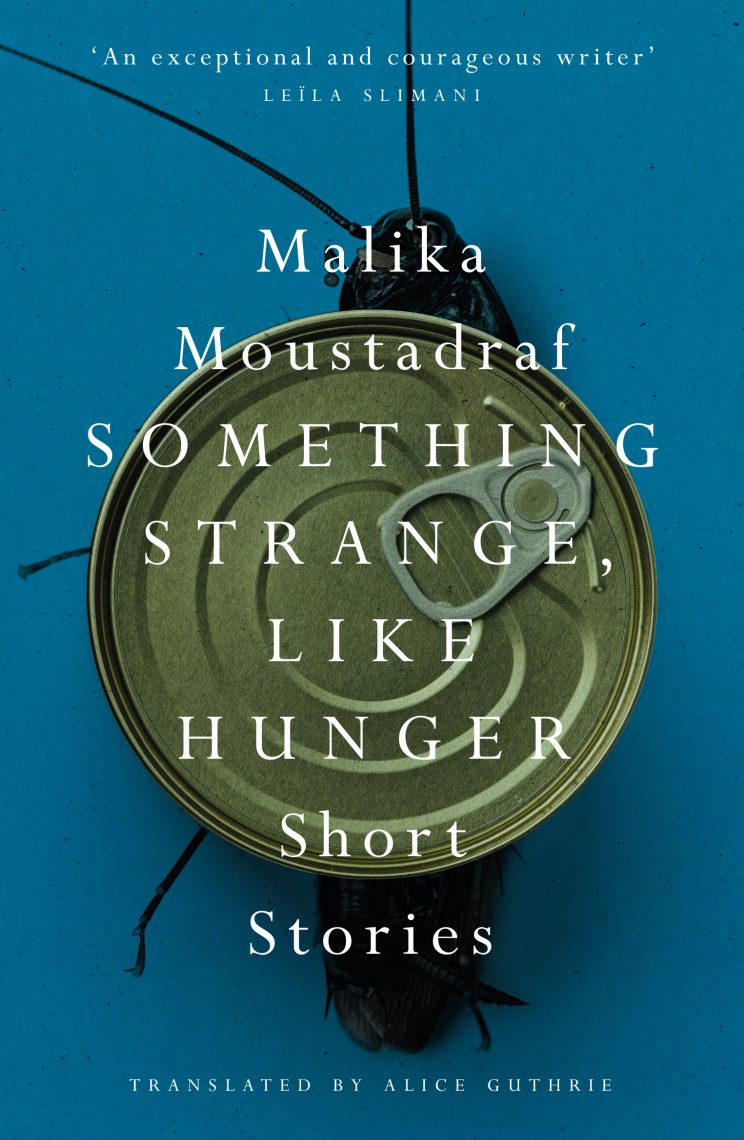
Malika Moustadraf (1969—2006) is a feminist icon in contemporary Moroccan literature, celebrated for her stark interrogation of gender and sexuality in North Africa. Something Strange, Like Hunger* is the complete collection of Moustadraf’s published short fiction: haunting, visceral stories by a master of the genre. A teenage girl suffers through a dystopian rite of passage, a man with kidney disease makes desperate attempts to secure treatment, and a mother schemes to ensure her daughter passes a virginity test. Delighting in vibrant sensory detail and rich slang, Moustadraf takes an unflinching look at the gendered body, social class, illness, double standards, and desire, as lived by a diverse cast of characters. Blood Feast is a sharp provocation to patriarchal power and a celebration of the life and genius of one of Morocco’s preeminent writers.
* The U.S. title is Blood Feast.
February 2022 selection was The Fortune Men, by Nadifa Mohamed
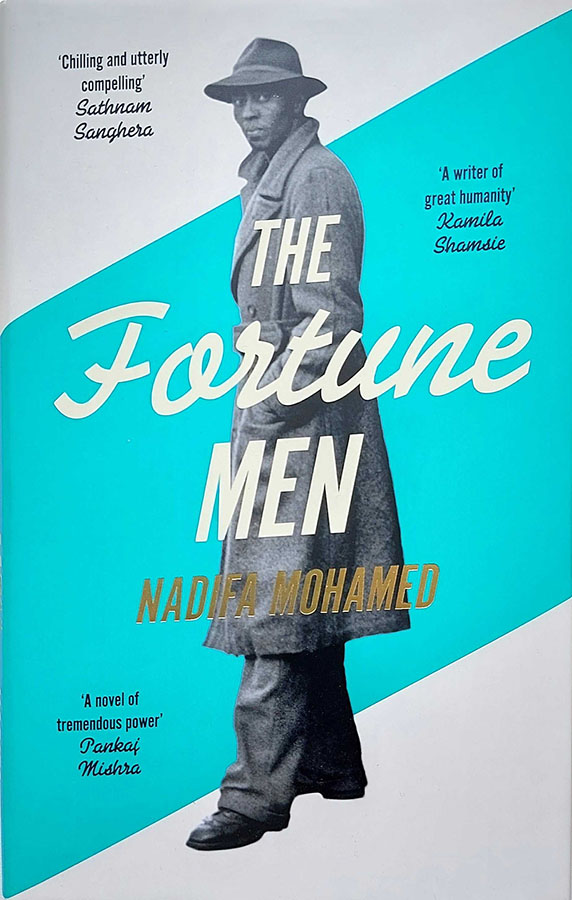 A Booker Prize finalist, Nadifa Mohamed’s novel The Fortune Men is based on a true event, the story of a murder, a miscarriage of justice, and a man too innocent for his times — “a blues song cut straight from the heart … brought alive with subtle artistry and heartbreaking humanity” (Walter Mosley, best-selling author of Devil in a Blue Dress). In Cardiff, Wales in 1952, Mahmood Mattan, a young Somali sailor, is accused of a crime he did not commit: the brutal killing of Violet Volacki, a shopkeeper from Tiger Bay. At first, Mahmood believes he can ignore the fingers pointing his way; he may be a gambler and a petty thief, but he is no murderer. He is a father of three, secure in his innocence and his belief in British justice. But as the trial draws closer, his prospect for freedom dwindles. Now, Mahmood must stage a terrifying fight for his life, with all the chips stacked against him: a shoddy investigation, an inhumane legal system, and, most evidently, pervasive and deep-rooted racism at every step. Under the shadow of the hangman’s noose, Mahmood begins to realize that even the truth may not be enough to save him. A haunting tale of miscarried justice, this book offers a chilling look at the dark corners of our humanity.
A Booker Prize finalist, Nadifa Mohamed’s novel The Fortune Men is based on a true event, the story of a murder, a miscarriage of justice, and a man too innocent for his times — “a blues song cut straight from the heart … brought alive with subtle artistry and heartbreaking humanity” (Walter Mosley, best-selling author of Devil in a Blue Dress). In Cardiff, Wales in 1952, Mahmood Mattan, a young Somali sailor, is accused of a crime he did not commit: the brutal killing of Violet Volacki, a shopkeeper from Tiger Bay. At first, Mahmood believes he can ignore the fingers pointing his way; he may be a gambler and a petty thief, but he is no murderer. He is a father of three, secure in his innocence and his belief in British justice. But as the trial draws closer, his prospect for freedom dwindles. Now, Mahmood must stage a terrifying fight for his life, with all the chips stacked against him: a shoddy investigation, an inhumane legal system, and, most evidently, pervasive and deep-rooted racism at every step. Under the shadow of the hangman’s noose, Mahmood begins to realize that even the truth may not be enough to save him. A haunting tale of miscarried justice, this book offers a chilling look at the dark corners of our humanity.
Past Titles Read by TMR’s Bookgroup Include:
- Ayad Akhtar’s novel Homeland Elegies
- Malu Halasa’s novel Mother of All Pigs
- Laila Lalami’s Conditional Citizens
- Hassan Blasim’s short novel God 99
- Dima Alzayat’s Alligator and Other Stories
- Sahar Mustafah’s novel The Beauty in Your Face
- Tobie Nathan’s A Land Like You (reviewed in TMR here)
- Susan Abulhawa’s Against the Loveless World (reviewed in TMRhere)
- Hoda Barakat’s Voices of the Lost (reviewed in TMR here)
- Sinan Antoon’s I’jaam
- Omar El Akkad’s What Strange Paradise
- Abdulrazak Gurnah’s Paradise
The group is captained by Rana Asfour, TMR’s Managing Editor.
To join The Markaz Review Book Club (free, all welcome) please fill out this form.

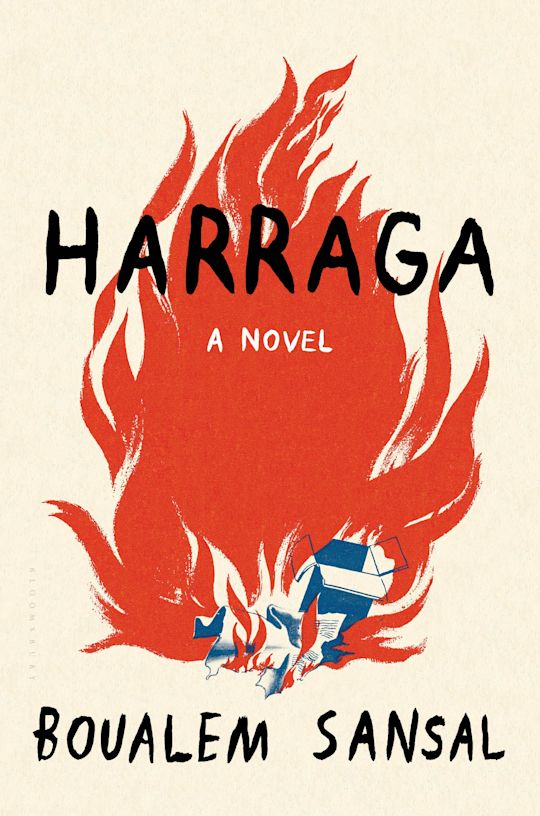
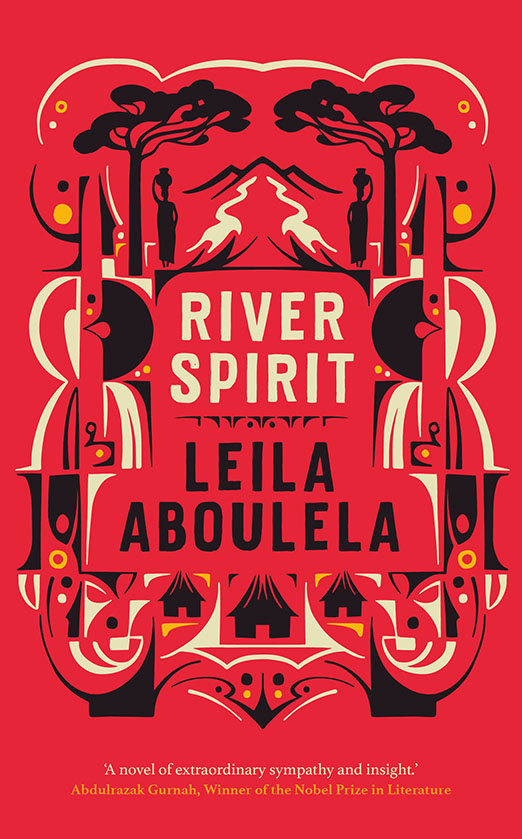
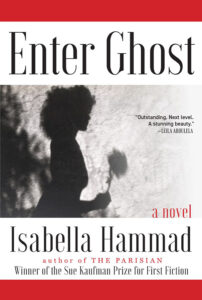 The June 2023 BookGroup Selection was Enter Ghost, a novel by Isabella Hammad
The June 2023 BookGroup Selection was Enter Ghost, a novel by Isabella Hammad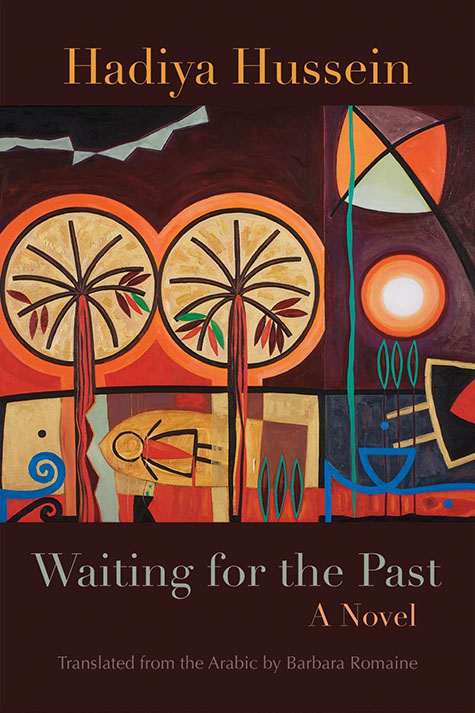
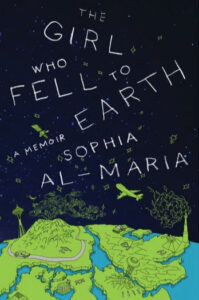
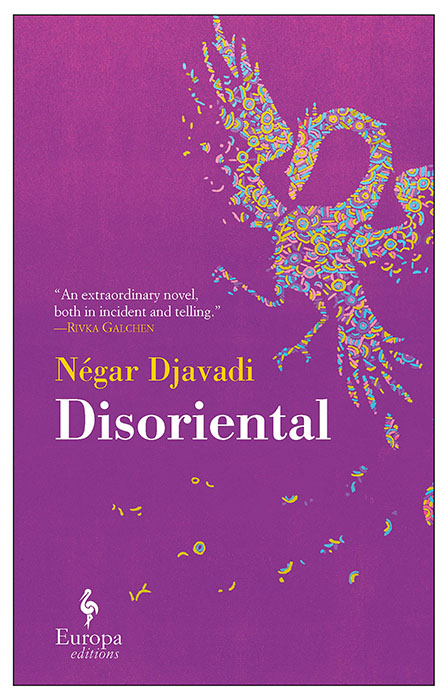 February 2023 Selection was Disoriental, the novel by Négar Djavadi.
February 2023 Selection was Disoriental, the novel by Négar Djavadi.